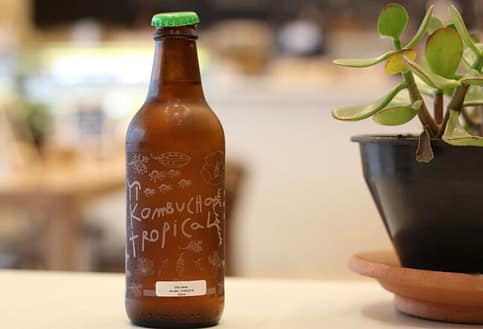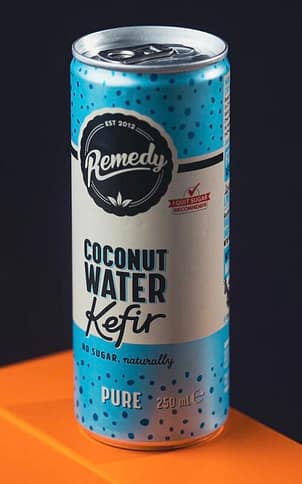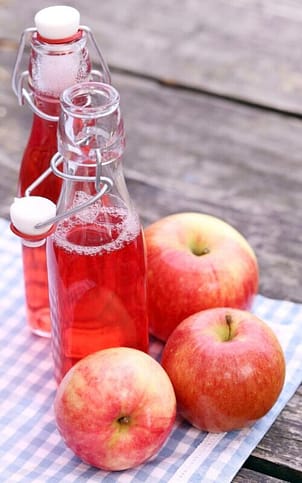Explore 4 Nutrient-Packed Fermented Beverages for a wellness boost: 1. Kombucha, rich in probiotics and antioxidants. 2. Water Kefir, a dairy-free probiotic option. 3. Beet Kvass, a vibrant fermented vegetable juice. 4. Jun Tea, a unique blend of green tea and honey for a diverse nutrient profile.
Savor these beverages for a wealth of health benefits. Packed with probiotics, they support gut health, aiding digestion. Antioxidants combat oxidative stress, promoting overall well-being. Rich in vitamins and minerals, they contribute to a balanced diet. Embrace these drinks for a flavorful journey to a healthier you.
I. Introduction
Explore a world where health meets indulgence as we uncover the benefits of 4 nutrient-packed fermented beverages. Elevate your well-being and tantalize your taste buds with each sip, discovering a flavorful path to a revitalized you. Cheers to embracing the goodness of 4 Nutrient-Packed Fermented Beverages!
II. Health Benefits of Fermented Beverages
A. Introduction to probiotics and their role in fermented beverages
Probiotics often hailed as "good bacteria," are living microorganisms that confer numerous health benefits when consumed. These friendly bacteria play a vital role in maintaining a balanced gut microbiome, which is crucial for overall well-being.
Fermented beverages are a powerful vehicle for delivering probiotics to our bodies, as the fermentation process encourages the growth of these beneficial microorganisms. By incorporating fermented beverages into our daily routines, we can support digestion, enhance nutrient absorption, strengthen the immune system, and even promote mental well-being.
B. Boosting gut health and improving digestion
One of the primary benefits of fermented beverages is their ability to boost gut health and improve digestion. The probiotics found in these beverages, such as lactobacilli and bifidobacteria, help restore and maintain a healthy balance of bacteria in the gut. This balance is essential for optimal digestion and nutrient absorption.
Fermented beverages work by introducing beneficial bacteria into the digestive system. These bacteria aid in breaking down food, enhancing the breakdown of complex carbohydrates, proteins, and fats. As a result, digestion becomes more efficient, reducing bloating, gas, and discomfort.
Moreover, fermented beverages promote the production of enzymes that assist in the digestion process, leading to better nutrient absorption. This means that the vitamins, minerals, and other essential nutrients present in the foods we consume are better utilized by the body.
By incorporating fermented beverages into your daily routine, you can support a healthy gut microbiome, improve digestion, and experience the benefits of a well-functioning digestive system. Say goodbye to digestive woes and embrace the nourishing power of fermented beverages for a happier, more comfortable digestive experience.
C. Strengthening the immune system
Fermented beverages have the remarkable ability to strengthen the immune system. The probiotics found in these beverages play a crucial role in supporting immune function.
A significant portion of our immune system resides in the gut, and a healthy balance of gut bacteria is essential for optimal immune function. Probiotics in fermented beverages help to populate the gut with beneficial bacteria, creating an environment that supports immune health.
Research suggests that probiotics can enhance the activity of immune cells, such as natural killer cells and T-cells, which play a crucial role in defending the body against pathogens. By strengthening the immune response, fermented beverages may help reduce the risk of infections and support overall immune resilience.
D. Potential effects on mental health and mood
Fermented beverages not only contribute to physical health but also have the potential to positively impact mental health and overall well-being. Emerging research suggests that the gut-brain connection plays a crucial role in mental well-being, and fermented beverages can influence this connection through their probiotic content.
The gut microbiota produces neurotransmitters like serotonin, which plays a key role in regulating mood. Probiotics in fermented beverages have been found to modulate the production and activity of neurotransmitters, potentially positively influencing mood and mental health.
Consuming fermented beverages has been associated with reduced symptoms of anxiety and depression in some studies. The probiotics may help regulate the body's stress response and promote a sense of calmness and well-being. Additionally, the anti-inflammatory properties of fermented beverages may have indirect effects on mental health, as chronic inflammation has been linked to various mental health disorders.

III. 4 Nutrient-Packed Fermented Beverages
A. Kombucha
1. Overview of kombucha and its fermentation process
Kombucha is a popular fermented beverage known for its tangy, slightly effervescent flavor. It passed through a fascinating fermentation process that combines tea, sugar, and a symbiotic culture of bacteria and yeast (SCOBY).
With its intriguing fermentation process, kombucha offers a refreshing and probiotic-rich beverage that has gained popularity for its potential health benefits and unique taste profiles.
2. Health benefits of kombucha
Kombucha offers a range of potential health benefits due to its fermentation process and probiotic content. While individual experiences may vary, here are some commonly reported health benefits of consuming kombucha:
a. Probiotic Support
Kombucha is rich in probiotics, which are beneficial bacteria that promote a healthy balance in the gut microbiome. These probiotics support digestion, nutrient absorption, and overall gut health.
b. Improved Digestion
The organic acids produced during kombucha fermentation, such as acetic acid and gluconic acid, can aid in digestion by enhancing the breakdown of food and supporting the growth of beneficial gut bacteria.
c. Enhanced Immune Function
The probiotics found in kombucha can help strengthen the immune system by supporting the activity of immune cells. A healthy gut microbiome is closely linked to immune function, and consuming kombucha may contribute to a more robust immune response.
d. Detoxification Support
Kombucha contains glucuronic acid, a compound known for its potential detoxifying properties. Glucuronic acid may bind to toxins in the body, aiding their elimination through the liver and kidneys.
e. Antioxidant Activity
Kombucha is a source of antioxidants, which help neutralize harmful free radicals in the body. Antioxidants protect against cellular damage, inflammation, and oxidative stress, which are associated with various chronic diseases.
f. Potential Weight Management
Some studies suggest that kombucha may aid in weight management by supporting metabolism and promoting a healthy balance of gut bacteria. However, more research is needed to understand the effects of kombucha on weight.
g. Increased Energy and Vitality
The B vitamins present in kombucha, along with the small amount of caffeine naturally occurring in tea, may provide a mild energy boost. Additionally, kombucha enthusiasts often feel more refreshed and revitalized after consuming it.
B. Coconut Water Kefir
Coconut water kefir is a fermented beverage made by fermenting coconut water with kefir grains. Kefir grains are a symbiotic culture of bacteria and yeast (SCOBY) that initiate the fermentation process. This results in a probiotic-rich drink with a unique flavor profile.
1. Nutrient Profile
a. Probiotics
Coconut water kefir is a potent source of probiotics, beneficial microorganisms that support gut health and boost the immune system.
b. Electrolytes
Coconut water is naturally rich in electrolytes, such as potassium, sodium, and magnesium. The fermentation process may enhance the bioavailability of these minerals.
c. Vitamins
The drink contains B vitamins, particularly B1 (thiamine), B2 (riboflavin), B3 (niacin), B6 (pyridoxine), and B9 (folate), which play essential roles in energy metabolism and overall health.
d. Enzymes
Fermentation produces enzymes that aid in digestion and nutrient absorption.
e. Antioxidants
The process of fermentation can increase the antioxidant content of the beverage, providing protection against oxidative stress.
f. Low in Sugar
If properly fermented, coconut water kefir can be low in sugar compared to commercially available sugary beverages, making it a healthier option.
Incorporating coconut water kefir into your diet can be a delicious way to enhance your hydration, support digestion, and promote overall well-being. As with any fermented beverage, it's advisable to choose or make options with minimal added sugars for maximum health benefits.

C. Beet Kvass
Beet kvass is a traditional Eastern European fermented beverage made by fermenting beets with water and salt. This ruby-red elixir has a tangy flavor and is known for its potential health benefits.
1. Nutrient Profile
a. Probiotics
Beet kvass is a natural source of probiotics, supporting a healthy gut microbiome and digestive system.
b. Vitamins and Minerals
It's rich in vitamins like vitamin C, essential for immune health, and minerals such as potassium, manganese, and folate.
c. Antioxidants
The fermentation process enhances the antioxidant content, helping combat oxidative stress and inflammation.
d. Betaine
Beets are a natural source of betaine, which supports liver health and may contribute to cardiovascular well-being.
e. Dietary Nitrate
Beets contain dietary nitrates, which can convert to nitric oxide in the body, potentially supporting improved blood flow and exercise performance.
2. Health Benefits
a. Digestive Health
Probiotics in beet kvass promote a healthy balance of gut bacteria, aiding digestion and nutrient absorption.
b. Detoxification
Betaine supports liver function, playing a role in detoxification processes.
c. Heart Health
The potential benefits of dietary nitrates include improved blood vessel function, contributing to heart health.
d. Hydration
Beet kvass provides hydration along with beneficial nutrients, making it a refreshing and nutritious beverage.
Incorporating beet kvass into your diet can be a flavorful way to boost your nutrient intake and support various aspects of your health. As with any food or drink, it's important to enjoy it as part of a balanced and varied diet.
D. Fermented Fruit Juice
Fermented fruit juice is a beverage created by fermenting natural fruit juices with the help of beneficial bacteria and yeast. This process results in a probiotic-rich drink with a unique taste and potential health benefits.
1. Nutrient Profile
a. Probiotics
The fermentation of fruit juice introduces beneficial bacteria, contributing to a healthy gut microbiome and aiding digestion.
b. Vitamins and Minerals
Depending on the fruit used, fermented fruit juice can retain vitamins like vitamin C and minerals such as potassium, contributing to immune function and overall well-being.
c. Antioxidants
The fermentation process may enhance the antioxidant content of the juice, helping to combat oxidative stress and inflammation.
d. Enzymes
Fermented fruit juice contains enzymes that can aid in the breakdown of nutrients, potentially improving digestion and nutrient absorption.
2. Health Benefits
a. Gut Health
Probiotics in fermented fruit juice promote a balanced gut microbiome, supporting digestion and potentially enhancing nutrient absorption.
b. Immune Support
Vitamin C from the fruit juice, coupled with the benefits of probiotics, can contribute to immune system function.
c. Antioxidant Protection
The presence of antioxidants helps protect cells from damage caused by free radicals, contributing to overall health.
d. Digestive Aid
Enzymes in fermented fruit juice can assist in the digestion of nutrients, potentially alleviating digestive issues.
When incorporating fermented fruit juice into your diet, it's essential to choose options with minimal added sugars to maximize health benefits. Additionally, enjoying a variety of fermented foods and beverages can contribute to a diverse and robust microbiome.

IV. Naturally fermented beverages
A. Are all fermented beverages natural?
While the process of fermentation itself is natural, not all fermented beverages are necessarily natural. The naturalness of a fermented beverage depends on the ingredients used and the fermentation process employed.
Traditionally, fermented beverages are made using natural ingredients such as fruits, vegetables, grains, or herbs, along with water and sometimes added sweeteners. The fermentation process occurs when beneficial bacteria, yeast, or other microorganisms naturally present in the ingredients convert sugars into alcohol or acids. These natural fermentation processes can result in beverages like kombucha, kefir, kvass, and ginger beer.
However, in the commercial market, there may be variations of fermented beverages that include artificial ingredients, additives, or preservatives. Some commercially produced fermented beverages might undergo additional processing steps or have certain components added to enhance flavors, extend shelf life, or achieve specific qualities. These additives may not be considered natural.
To ensure the naturalness of fermented beverages, it's important to read labels, choose products with simple ingredient lists, and, if possible, opt for homemade or artisanal options that prioritize using natural and organic ingredients. Making fermented beverages at home allows you to have full control over the ingredients used and the fermentation process, ensuring a more natural product.
Ultimately, the naturalness of fermented beverages can vary depending on the specific product and its production methods. It's essential to make informed choices and select options that align with your preferences for natural and organic ingredients.
B. How can I identify natural or non-natural fermented beverages?
To identify whether a fermented beverage is natural or non-natural, here are some factors to consider:
1. Ingredient List
Check the ingredient list on the product packaging or label. Naturally fermented beverages typically have simple ingredient lists that include natural and recognizable components such as fruits, vegetables, grains, herbs, water, and sweeteners like honey or cane sugar. Avoid beverages that contain artificial additives, flavors, colors, or preservatives.
a. Organic Certification
Look for fermented beverages that are labeled as organic. Organic certification ensures that the ingredients used in the beverage are grown without synthetic pesticides, fertilizers, or genetically modified organisms (GMOs).
b. Artisanal or Homemade Options
Consider seeking out fermented beverages that are homemade or produced by artisanal producers who prioritize using natural ingredients and traditional fermentation methods. These options tend to have a higher likelihood of being natural and less processed.
c. Processing Methods
Fermentation processes that closely follow traditional methods are more likely to result in natural beverages. Traditional fermentation relies on naturally occurring microorganisms to initiate and complete the fermentation process without the use of additives or excessive manipulation.
d. Research Brands and Manufacturers
Research the brand or manufacturer of the fermented beverage. Look for information on their website, social media, or other sources to learn about their sourcing practices, fermentation methods, and commitment to using natural ingredients.
e. Taste and Texture
Naturally fermented beverages often have a unique taste and texture that reflects the fermentation process. They may exhibit natural tartness, tanginess, or effervescence derived from the fermentation of sugars. Non-natural or heavily processed fermented beverages may have artificial flavors or a taste that seems overly sweet or artificial.
C. Here's a table comparing a non-natural fermented beverage with a natural fermented beverage:
Non-Natural Fermented Beverage | Natural Fermented Beverage | |
|---|---|---|
Ingredients | Water | Water |
Refined sugars or artificial sweeteners | Fresh fruits, vegetables, or grains | |
Artificial flavors | Natural sweeteners (e.g., honey, maple syrup) | |
Acids (e.g., citric acid) | Fermentation starter (e.g., SCOBY, kefir grains) | |
Preservatives | Flavor enhancers (e.g., herbs, spices, fruits) | |
Artificial colors | ||
Stabilizers or thickeners | ||
Carbonation agents | ||
Processing Methods | Heavily processed, using synthetic additives and preservatives | Follows traditional fermentation methods, relying on natural microorganisms |
Organic Certification | Not guaranteed | May be organic-certified, indicating the use of organic ingredients |
Flavor and Quality | Artificial or heavily processed taste, may lack complexity | Natural flavors derived from real ingredients, potentially more complex taste profiles |
Health Benefits | Fewer potential health benefits due to synthetic additives and lower quality ingredients | Rich in probiotics, vitamins, minerals, and potentially other health-promoting compounds |
Environmental Impact | May contribute to environmental pollution and waste due to synthetic additives and unsustainable sourcing | Potentially lower environmental impact with the use of natural ingredients and sustainable sourcing |
DIY Potential | Limited DIY potential, as the ingredients and processes may be more complex | High DIY potential, allowing for control over ingredients and customization |
It's important to note that this table provides a general comparison, and the specific characteristics of non-natural and natural fermented beverages may vary depending on the product and brand. When selecting fermented beverages, it's advisable to read the ingredient list and consider factors such as sourcing, processing methods, and potential health benefits to make an informed choice that aligns with your preferences and values.
V. Additional References
- Traditional Fermented Foods and Beverages from around the World and Their Health Benefits (2022) https://www.ncbi.nlm.nih.gov/pmc/articles/PMC9227559/
- Strategies to Improve the Potential Functionality of Fruit-Based Fermented Beverages (2021) https://www.ncbi.nlm.nih.gov/pmc/articles/PMC8623731/
- Innovative Fermented Beverages Made with Red Rice, Barley, and Buckwheat (2021) https://www.ncbi.nlm.nih.gov/pmc/articles/PMC8000499/
VI. Conclusion
Fermented beverages offer a fascinating world of flavors, health benefits, and creative possibilities. From the popular kombucha and kefir to the lesser-known kvass and apple cider, these beverages showcase the wonders of natural fermentation and its influence on our well-being.
As you explore the realm of fermented beverages, remember to prioritize natural and organic options whenever possible. Seek out products with simple ingredient lists and consider making your own at home for full control over the fermentation process and ingredient choices.
So, raise a glass to the ancient art of fermentation and its profound influence on our lives. Let the health benefits, creative possibilities and 4 nutrient-packed fermented beverages inspire a journey of exploration and well-being. Cheers to the transformative power of fermentation and the joy it brings to our palates, bodies, and spirits!
VII. My Experience
I have always been passionate about discovering new and healthy food options. That passion led me to explore the world of fermented beverages, which are 4 nutrient-packed fermented beverages! It can provide a variety of health benefits. You can visit my blog post about fermented beverages starter culture, non-alcoholic fermented beverage and taste profiles.
Unfortunately, these special drinks are not yet widely available in restaurants or convenience stores. But I am confident that as more people become aware of their potential advantages, demand will increase and businesses will begin investing in them to meet the needs of health-conscious consumers like us! You can also try out homemade fermented beverages, read my blog post about it.
In your area, are fermented beverages becoming easily accessible? I'd love to hear your experiences and feedback on this topic.

 Simple. Natural. Better.
Simple. Natural. Better.